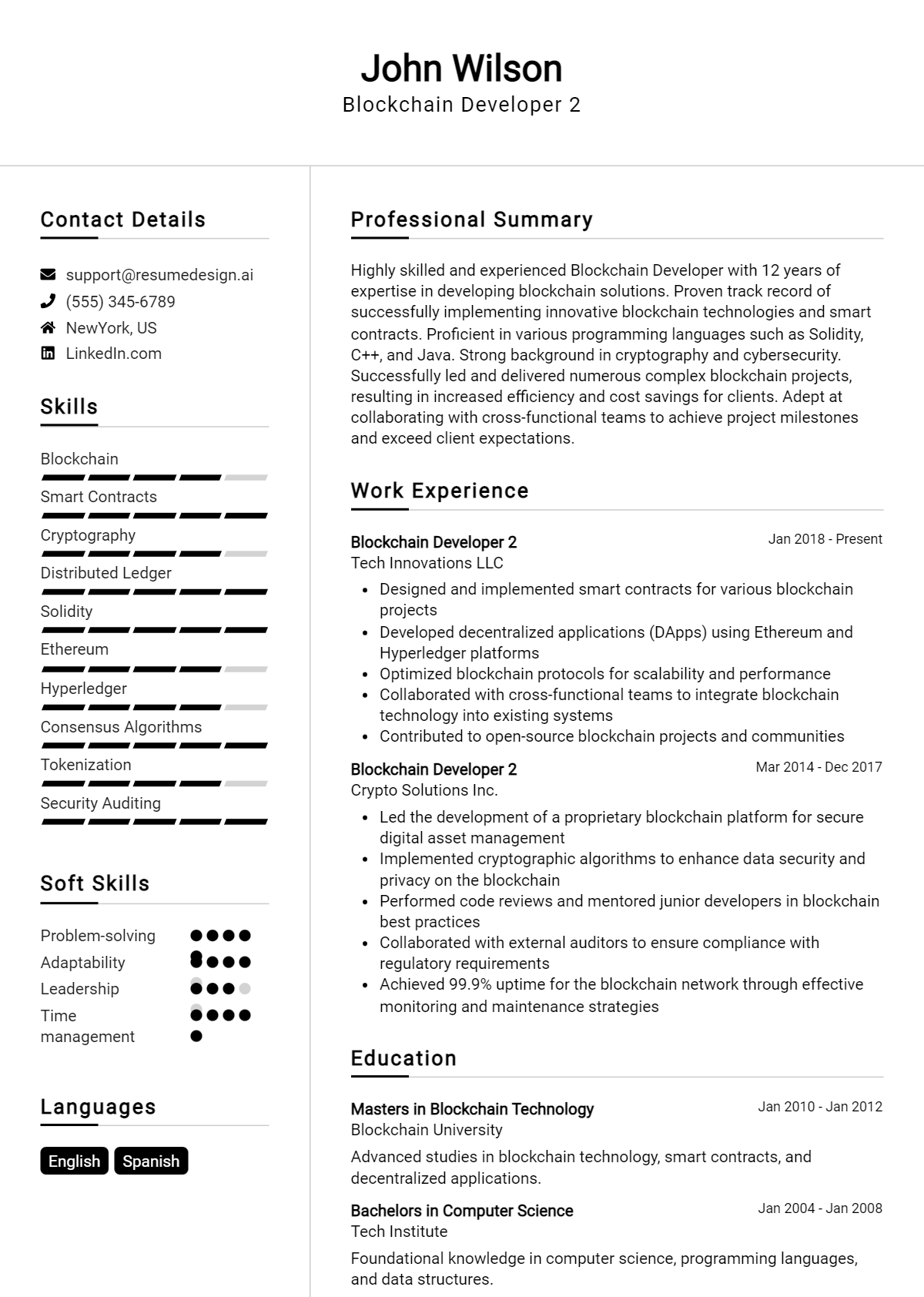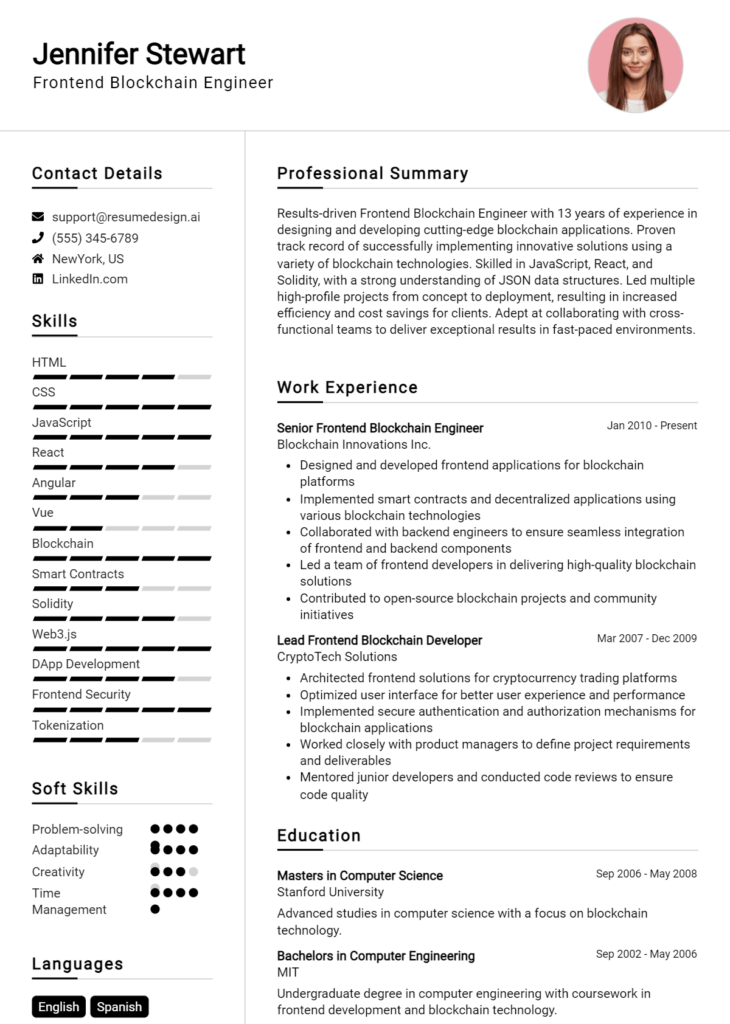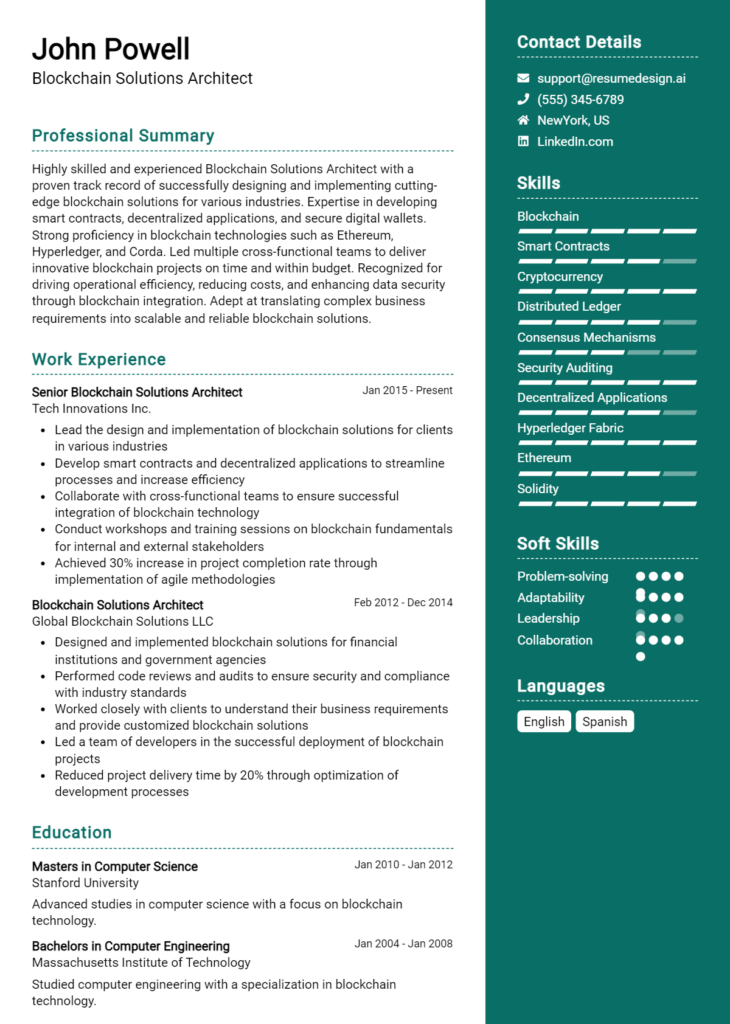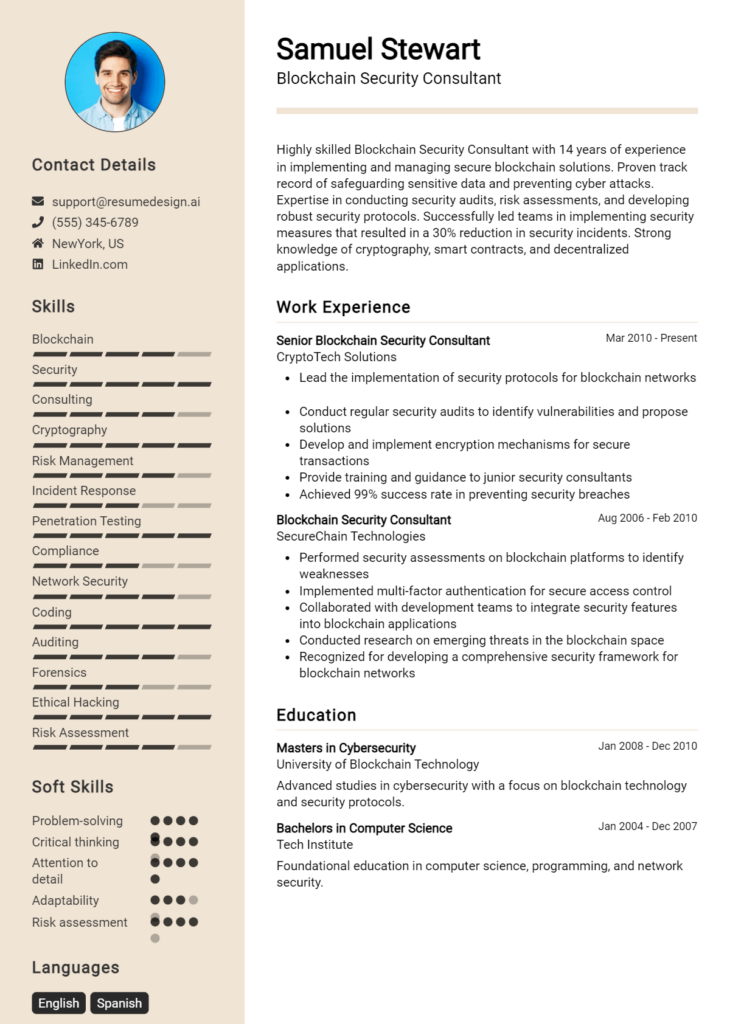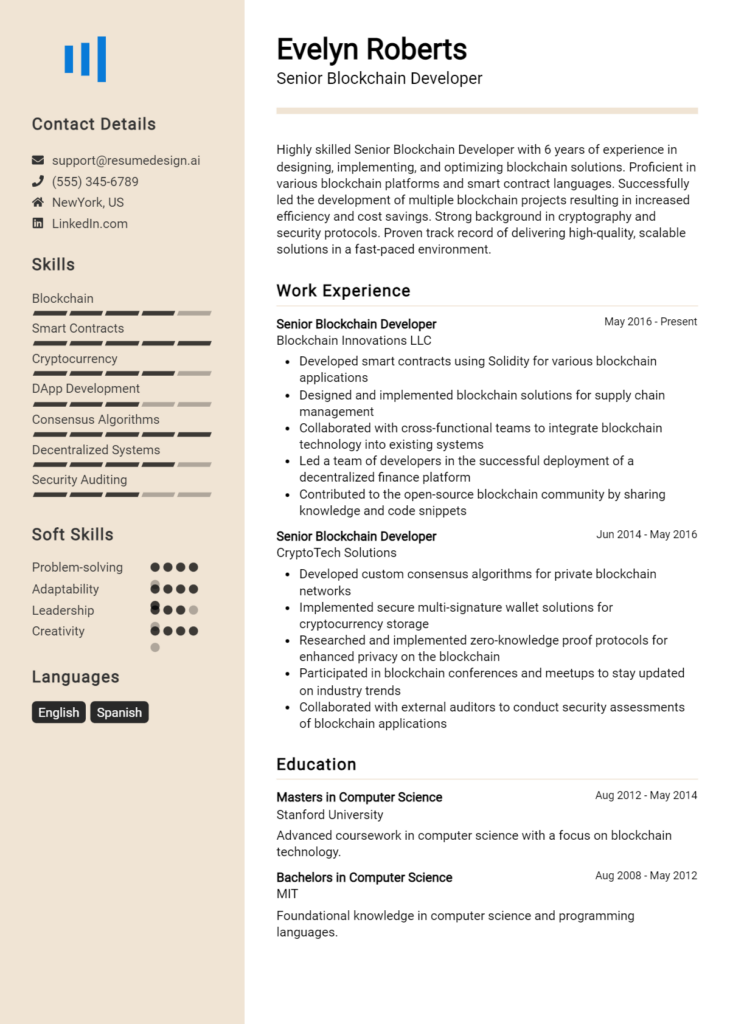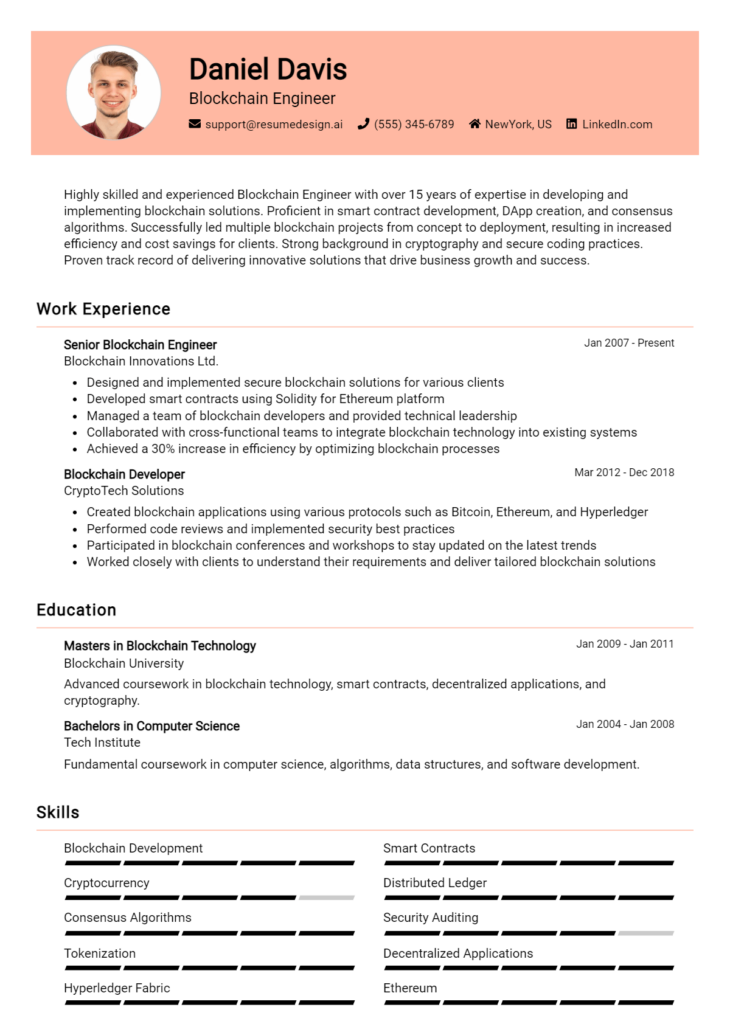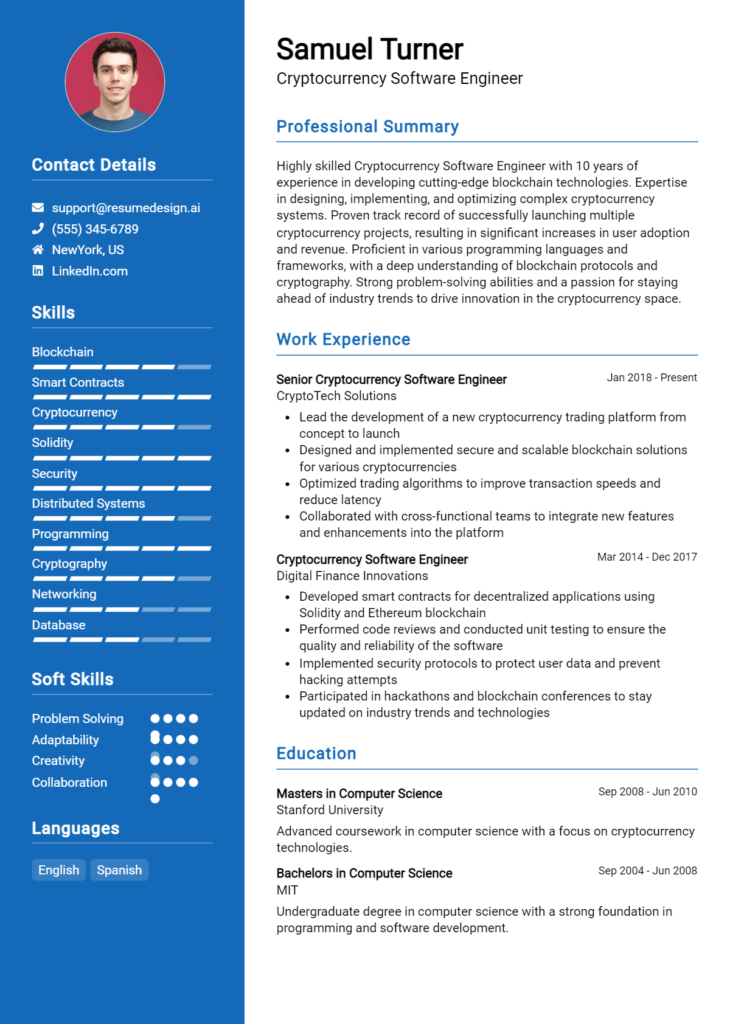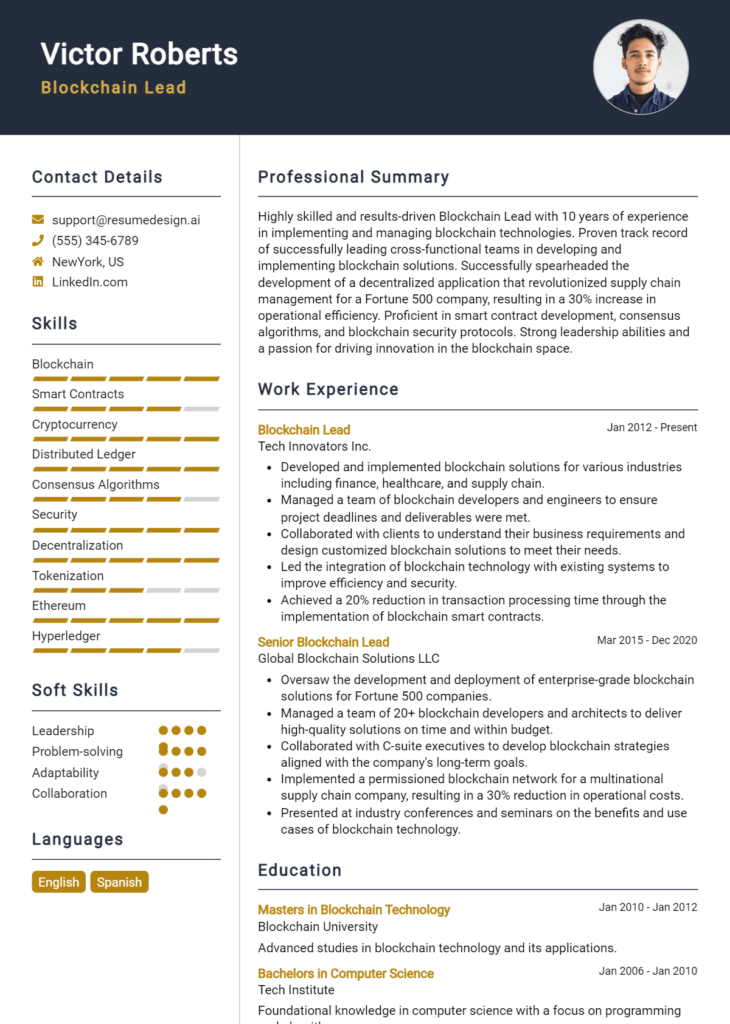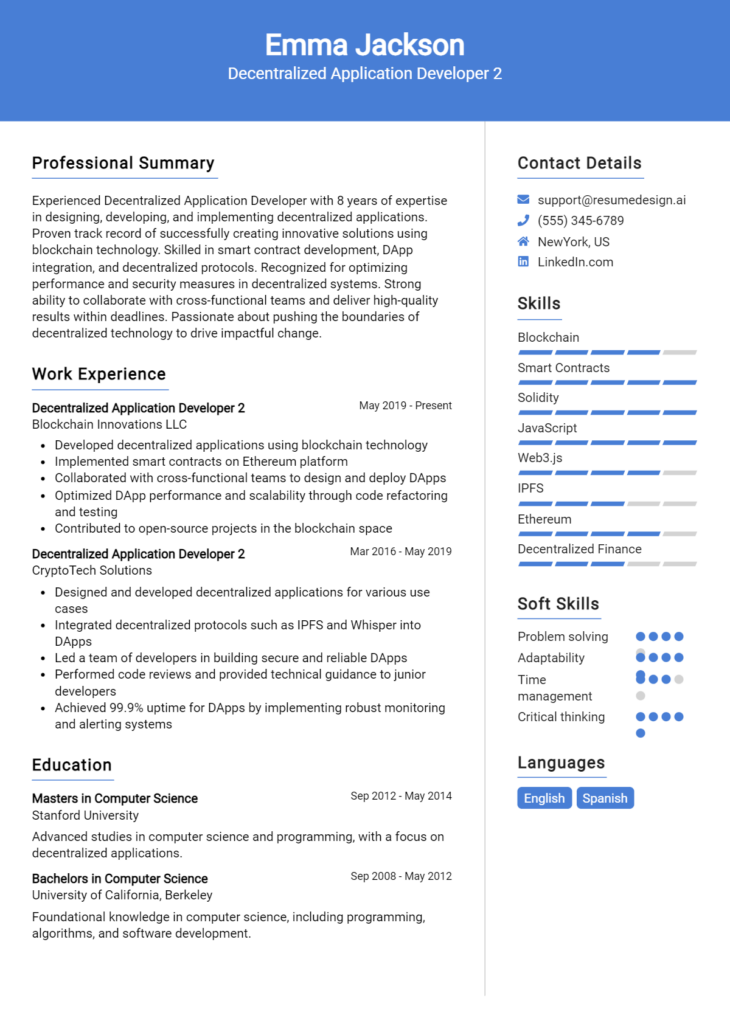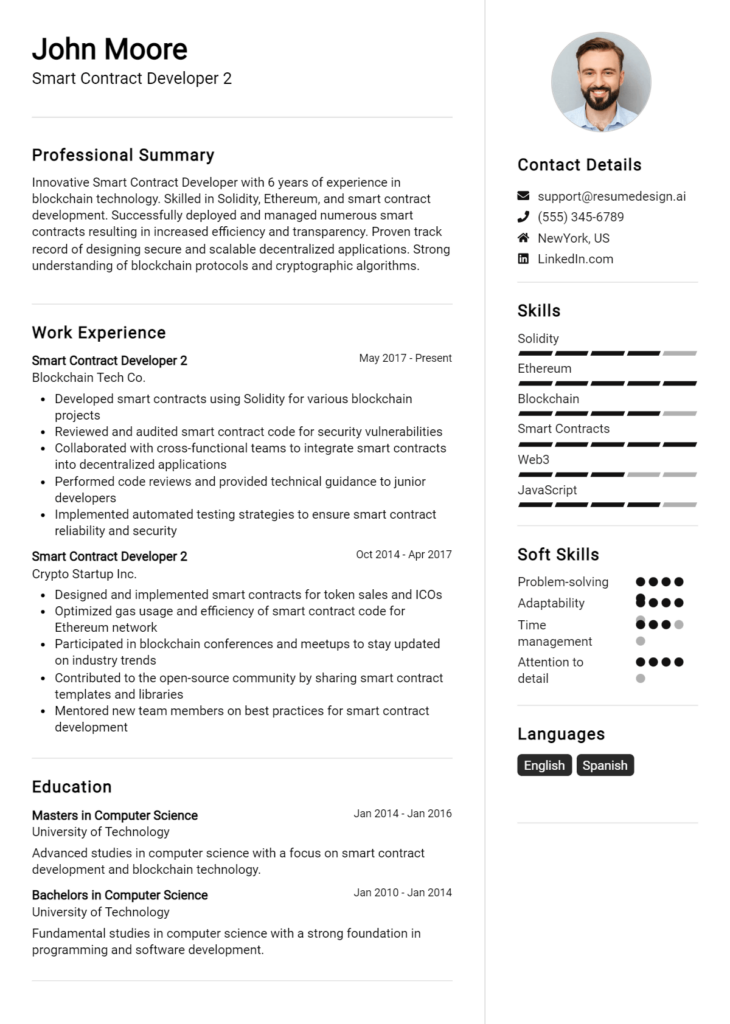Blockchain Developer Core Responsibilities
A Blockchain Developer plays a crucial role in designing, implementing, and maintaining blockchain solutions that enhance operational efficiency and security across various departments. This requires a strong foundation in programming languages, cryptographic techniques, and distributed systems, alongside problem-solving capabilities to troubleshoot and innovate. A well-structured resume that highlights these technical and operational skills can effectively showcase how the developer contributes to the organization’s strategic goals and fosters collaboration between technical and business teams.
Common Responsibilities Listed on Blockchain Developer Resume
- Designing and developing blockchain-based applications and smart contracts.
- Collaborating with cross-functional teams to identify and analyze requirements.
- Implementing security protocols to ensure data integrity and confidentiality.
- Conducting feasibility assessments and performance evaluations of blockchain solutions.
- Debugging and troubleshooting blockchain systems and applications.
- Staying updated with the latest blockchain technologies and trends.
- Participating in code reviews and maintaining documentation.
- Integrating blockchain solutions with existing systems and APIs.
- Optimizing blockchain performance and scalability.
- Providing training and support to team members on blockchain technologies.
- Contributing to the development of blockchain governance frameworks.
- Engaging with stakeholders to gather feedback and improve solutions.
High-Level Resume Tips for Blockchain Developer Professionals
In the competitive landscape of the tech industry, a well-crafted resume is crucial for Blockchain Developer professionals aiming to make a lasting impression on potential employers. Your resume serves as the first point of contact, and it needs to effectively showcase your unique skills and achievements in a field that is rapidly evolving. A strong resume not only highlights your technical expertise but also demonstrates your ability to contribute to innovative projects in blockchain technology. This guide will provide practical and actionable resume tips specifically tailored for Blockchain Developer professionals, helping you create a standout document that catches the eye of hiring managers.
Top Resume Tips for Blockchain Developer Professionals
- Tailor your resume to the job description by including relevant keywords and phrases that match the specific requirements of the role.
- Showcase your relevant experience in blockchain development, including specific projects you have worked on and the technologies used.
- Quantify your achievements by including metrics, such as percentage improvements, cost savings, or project timelines, to demonstrate your impact.
- Highlight industry-specific skills, such as smart contract development, decentralized application (DApp) creation, or knowledge of blockchain platforms like Ethereum or Hyperledger.
- Include certifications and training relevant to blockchain technology to enhance your credibility and showcase your commitment to ongoing learning.
- Utilize a clean and professional format that emphasizes clarity and readability, ensuring hiring managers can quickly find key information.
- Incorporate a summary statement that succinctly captures your career objectives and unique value proposition as a Blockchain Developer.
- Demonstrate soft skills such as problem-solving, collaboration, and communication, as they are essential in the tech industry.
- Consider adding a section for relevant open-source contributions or community involvement in blockchain projects to showcase your passion and engagement in the field.
By implementing these tips, you can significantly increase your chances of landing a job in the Blockchain Developer field. A well-structured and tailored resume not only highlights your technical capabilities but also distinguishes you from other candidates, making you a more attractive prospect to potential employers in this dynamic and innovative industry.
Why Resume Headlines & Titles are Important for Blockchain Developer
In the competitive field of blockchain development, where expertise and innovation are paramount, a well-crafted resume headline or title serves as a crucial first impression. This succinct phrase can immediately capture the attention of hiring managers, summarizing a candidate's core qualifications and unique value proposition in just a few words. A strong headline not only highlights key skills and experience but also sets the tone for the rest of the resume. It should be concise, relevant, and directly aligned with the job being applied for, ensuring that it resonates with the specific requirements of the position.
Best Practices for Crafting Resume Headlines for Blockchain Developer
- Keep it concise: Aim for a headline that is no longer than 10-12 words.
- Be role-specific: Tailor your headline to reflect the specific role of a blockchain developer.
- Highlight key skills: Incorporate important skills or technologies relevant to blockchain development.
- Use action words: Start with strong action verbs to convey your capabilities effectively.
- Showcase your achievements: If possible, include a notable accomplishment to add credibility.
- Integrate industry keywords: Use relevant terms that align with the blockchain job description.
- Avoid jargon: Ensure your headline is easily understandable to a broader audience.
- Make it impactful: Choose words that evoke interest and demonstrate your expertise.
Example Resume Headlines for Blockchain Developer
Strong Resume Headlines
Innovative Blockchain Developer with 5+ Years in Smart Contract Development
Expert in Decentralized Applications (DApps) with Proven Track Record
Blockchain Solutions Architect Specializing in Security and Scalability
Passionate Blockchain Developer Focused on Real-World Use Cases and Integration
Weak Resume Headlines
Blockchain Developer Looking for Opportunities
Tech Professional with Experience
Strong headlines are effective because they are specific, informative, and directly reflect the skills and experiences relevant to blockchain development. They provide hiring managers with immediate insight into the candidate’s strengths and areas of expertise, making it easier to assess fit for the role. In contrast, weak headlines often lack specificity and fail to convey any meaningful information about the candidate's qualifications, making them forgettable and less compelling in a crowded job market.
Writing an Exceptional Blockchain Developer Resume Summary
A resume summary is a vital component for any Blockchain Developer as it serves as the first impression to hiring managers. A strong summary effectively captures attention by succinctly highlighting key skills, relevant experience, and notable accomplishments that align with the job requirements. Given the competitive nature of the blockchain industry, a concise and impactful summary tailored to the specific position can significantly enhance a candidate's chances of standing out from the crowd and securing an interview.
Best Practices for Writing a Blockchain Developer Resume Summary
- Quantify achievements wherever possible to demonstrate impact, such as percentage improvements or successful project completions.
- Focus on relevant technical skills such as smart contract development, blockchain architecture, and programming languages like Solidity or JavaScript.
- Tailor the summary for each specific job description to ensure alignment with the employer’s needs and values.
- Use strong action verbs to convey enthusiasm and proactivity, such as "developed," "designed," or "implemented."
- Highlight any certifications or specialized training that bolster your qualifications as a blockchain developer.
- Keep the summary concise, ideally 2-4 sentences, making it easy for hiring managers to quickly grasp your qualifications.
- Showcase a blend of technical and soft skills, emphasizing teamwork, problem-solving, and adaptability in the rapidly evolving blockchain landscape.
- Incorporate industry-specific terminology that demonstrates familiarity with blockchain concepts and trends.
Example Blockchain Developer Resume Summaries
Strong Resume Summaries
Results-driven Blockchain Developer with over 5 years of experience in designing and implementing decentralized applications, achieving a 40% reduction in transaction times for clients through optimized smart contracts.
Innovative Blockchain Engineer skilled in developing blockchain solutions using Ethereum and Hyperledger, successfully leading a team that launched a supply chain management application, increasing transparency and lowering costs by 30%.
Detail-oriented Blockchain Developer with a proven track record of enhancing security protocols, contributing to a 50% decrease in system vulnerabilities through rigorous testing and code audits, while proficient in Solidity and JavaScript.
Weak Resume Summaries
Blockchain Developer with some experience in the field, looking for a new opportunity to work on exciting projects.
A passionate software developer interested in blockchain technology and eager to learn more about the industry.
The examples provided illustrate the differences between strong and weak resume summaries. Strong summaries effectively quantify achievements and specify relevant skills, thereby conveying the candidate's direct impact and expertise in the blockchain domain. In contrast, weak summaries lack detail, are overly generic, and fail to highlight any measurable outcomes or specific competencies, making it difficult for hiring managers to assess the candidate's suitability for the role.
Work Experience Section for Blockchain Developer Resume
The work experience section of a Blockchain Developer resume is pivotal in demonstrating a candidate's technical competencies and their ability to lead teams while delivering high-quality products. This section serves as a detailed account of past roles, showcasing not only the candidate's proficiency in blockchain technologies, programming languages, and development practices but also their experience in project management and collaborative efforts. By quantifying achievements—such as project completion times, cost savings, or user adoption rates—and aligning their experience with industry standards, candidates can effectively communicate their value to potential employers.
Best Practices for Blockchain Developer Work Experience
- Highlight relevant blockchain technologies and programming languages used in each position.
- Quantify achievements with specific metrics, such as percentage improvements or dollar amounts saved.
- Demonstrate leadership by describing team management experiences or mentoring roles.
- Include collaborative projects that showcase teamwork and cross-functional interactions.
- Tailor your experience to align with job descriptions and industry requirements.
- Use action verbs to convey your contributions and impact clearly.
- Prioritize recent experiences to show current knowledge and relevance in the field.
- Provide context for your roles, outlining the challenges faced and solutions implemented.
Example Work Experiences for Blockchain Developer
Strong Experiences
- Led a team of 5 developers in the creation of a decentralized application (dApp) that increased user engagement by 40% within six months of launch.
- Implemented a blockchain solution that reduced transaction times by 30%, resulting in an annual cost saving of $100,000 for the company.
- Collaborated with cross-functional teams to design and deploy a multi-signature wallet feature, enhancing security and attracting 1,000 new users within three months.
- Developed and delivered blockchain training sessions for 20+ team members, improving overall team competency and project delivery timelines by 25%.
Weak Experiences
- Worked on various blockchain projects without specific details on outcomes or responsibilities.
- Assisted in coding tasks for a blockchain solution without indicating personal contributions or results achieved.
- Participated in team meetings about blockchain technologies but did not provide context or impact of involvement.
- Engaged in development for a cryptocurrency platform with no quantifiable results or metrics to highlight success.
The examples classified as strong demonstrate clear, quantifiable outcomes and showcase leadership and collaboration in their roles, making them impactful to potential employers. In contrast, the weak experiences lack specificity and measurable results, which diminishes their effectiveness in conveying the candidate's capabilities. Focusing on concrete achievements and clear contributions is essential for creating a compelling work experience section.
Education and Certifications Section for Blockchain Developer Resume
The education and certifications section of a Blockchain Developer resume plays a crucial role in establishing the candidate's qualifications and expertise in this rapidly evolving field. This section serves to highlight the candidate's academic background, relevant certifications, and commitment to continuous learning, which are vital in demonstrating their readiness for the complexities of blockchain technology. By providing pertinent coursework, industry-recognized certifications, and specialized training, candidates can significantly enhance their credibility and showcase their alignment with the job requirements. This not only helps them stand out in a competitive job market but also assures potential employers of their technical competence and dedication to professional growth.
Best Practices for Blockchain Developer Education and Certifications
- Focus on relevant degrees in computer science, software engineering, or blockchain technology.
- List industry-recognized certifications such as Certified Ethereum Developer or Blockchain Council certifications.
- Include specialized training programs or online courses that showcase specific skills related to blockchain development.
- Highlight advanced degrees, such as a Master's in Blockchain Technology or a related field.
- Provide detailed descriptions of relevant coursework that pertains to blockchain protocols, smart contracts, and decentralized applications.
- Keep the section concise and tailored to the job description to maintain relevance.
- Regularly update the section to reflect new certifications or courses completed.
- Consider including links to online profiles or portfolios that demonstrate practical applications of the learned skills.
Example Education and Certifications for Blockchain Developer
Strong Examples
- Bachelor of Science in Computer Science, University of California, Berkeley (Graduated May 2020)
- Certified Ethereum Developer - Blockchain Council (2021)
- Blockchain Specialization, Coursera (Completed August 2022)
- Master’s Degree in Blockchain Technology, Stanford University (In Progress)
Weak Examples
- Bachelor of Arts in English Literature, University of Texas (Graduated May 2018)
- Certified Microsoft Office Specialist (2019)
- Basic Python Programming Course (Completed 2015)
- Diploma in Graphic Design, Community College (Completed 2016)
The examples listed as strong are considered highly relevant to the role of a Blockchain Developer, showcasing degrees and certifications that directly pertain to blockchain technology and development skills. They reflect a clear focus on the candidate's qualifications that align with industry demands. In contrast, the weak examples represent educational qualifications and certifications that lack relevance to blockchain development, indicating a misalignment with the job requirements and potentially undermining the candidate's credibility in this specialized field.
Top Skills & Keywords for Blockchain Developer Resume
As the demand for blockchain technology continues to grow across various industries, the importance of a well-crafted resume for a Blockchain Developer cannot be overstated. Skills play a crucial role in showcasing your qualifications and distinguishing you from other candidates in this competitive field. A strong resume highlights both hard and soft skills, reflecting not only your technical prowess but also your ability to collaborate, adapt, and communicate effectively within a team. The right combination of skills can significantly enhance your chances of landing an interview and ultimately securing a position in this rapidly evolving landscape.
Top Hard & Soft Skills for Blockchain Developer
Soft Skills
- Problem-solving
- Communication
- Teamwork
- Adaptability
- Critical thinking
- Attention to detail
- Time management
- Creativity
- Initiative
- Conflict resolution
Hard Skills
- Proficiency in blockchain platforms (e.g., Ethereum, Hyperledger)
- Smart contract development (e.g., Solidity, Vyper)
- Understanding of cryptographic principles
- Knowledge of consensus algorithms (e.g., Proof of Work, Proof of Stake)
- Familiarity with distributed ledger technologies
- Experience with programming languages (e.g., JavaScript, Python, Go)
- Database management skills (e.g., SQL, NoSQL)
- API development and integration
- Knowledge of security protocols and practices
- Familiarity with DevOps tools and practices
For more detailed insights on how to properly showcase your skills and work experience, refer to the respective resources that can help you tailor your resume effectively.
Stand Out with a Winning Blockchain Developer Cover Letter
Dear Hiring Manager,
I am writing to express my interest in the Blockchain Developer position at [Company Name], as advertised on [Job Board/Company Website]. With a strong foundation in blockchain technology, smart contract development, and decentralized application (dApp) creation, I am excited about the opportunity to contribute to your innovative projects. My experience in developing and deploying blockchain solutions, combined with a solid understanding of cryptographic principles, positions me well to help [Company Name] achieve its goals in the rapidly evolving digital landscape.
In my previous role at [Previous Company Name], I successfully designed and implemented a decentralized application that streamlined supply chain processes, resulting in a 30% reduction in operational costs. My proficiency in programming languages such as Solidity, JavaScript, and Python allowed me to create secure and efficient smart contracts, while my experience with Ethereum and Hyperledger frameworks enabled me to adapt to varying project requirements. I am particularly drawn to [Company Name] because of its commitment to innovation and its focus on building scalable blockchain solutions that drive real-world impact.
I am also adept at collaborating with cross-functional teams, ensuring cohesive integration between blockchain technology and existing systems. My passion for continuous learning has led me to stay updated on the latest advancements in the blockchain space, including Layer 2 solutions and interoperability protocols. I am eager to bring my technical skills and collaborative spirit to [Company Name] and contribute to the development of cutting-edge blockchain applications that enhance user experience and operational efficiency.
Thank you for considering my application. I am looking forward to the opportunity to discuss how my expertise in blockchain development aligns with the vision of [Company Name]. I am excited about the potential to work together and make a significant impact in the blockchain space.
Sincerely,
[Your Name]
[Your LinkedIn Profile or Website]
[Your Phone Number]
[Your Email Address]
Common Mistakes to Avoid in a Blockchain Developer Resume
When crafting a resume as a Blockchain Developer, it’s essential to present your skills and experiences effectively. However, many candidates make common mistakes that can undermine their chances of landing an interview. A well-structured and error-free resume is not just a reflection of your technical skills but also your attention to detail and professionalism in the blockchain industry. Here are some common pitfalls to avoid:
Vague Job Descriptions: Failing to clearly define your past roles can make it difficult for employers to gauge your experience. Be specific about your contributions and the technologies you used.
Ignoring Relevant Skills: Many developers neglect to list key blockchain-related skills such as knowledge of smart contracts, consensus algorithms, and cryptographic principles. Ensure you highlight all relevant competencies.
Overloading with Jargon: While it’s important to demonstrate technical knowledge, using excessive technical jargon can alienate non-technical recruiters. Aim for a balance that showcases your expertise without overwhelming the reader.
Neglecting Soft Skills: Blockchain development often requires teamwork and communication skills. Focusing solely on technical abilities can give a one-dimensional view of your capabilities. Include soft skills that illustrate your ability to collaborate and lead.
Poor Formatting: A cluttered or poorly organized resume can detract from your qualifications. Use clear headings, bullet points, and consistent formatting to enhance readability.
Lack of Projects or Portfolio: Omitting a section for projects can be a missed opportunity to showcase your practical experience. Include links to GitHub repositories or a portfolio that highlights your work in blockchain development.
Failure to Tailor Your Resume: Sending a generic resume to multiple employers can reduce your chances of success. Customize your resume for each application, emphasizing the skills and experiences that align with the specific job description.
Including Irrelevant Experience: While it’s important to showcase your background, including unrelated work experience can dilute your resume's focus. Stick to experiences that demonstrate your qualifications as a Blockchain Developer.
Conclusion
As we conclude our exploration of the essential skills and competencies required for a successful Blockchain Developer, it's important to recap the key points discussed. We highlighted the significance of proficiency in programming languages such as Solidity and JavaScript, an understanding of cryptography, and familiarity with various blockchain platforms like Ethereum and Hyperledger. Additionally, we emphasized the importance of staying updated with the rapidly evolving landscape of blockchain technology, as well as the necessity for strong problem-solving and analytical skills.
Now is the perfect time to take action and ensure your resume showcases your qualifications effectively. A well-crafted resume can make a significant difference in your job search. We encourage you to review your Blockchain Developer Resume and consider utilizing various tools to enhance it. You can explore a variety of resume templates to find a design that resonates with your professional brand. Additionally, the resume builder can provide you with a user-friendly platform to create a polished resume. Don’t forget to check out resume examples for inspiration and to ensure you're highlighting the most relevant skills. Lastly, make your application stand out with cover letter templates that complement your resume.
Take charge of your career today by refining your resume and increasing your chances of landing that coveted Blockchain Developer position!

